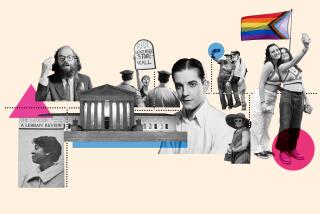COUNTRY CLUB PARK : Friends Pay Tribute to Gay Activist Legg
- Share via
In a garden ceremony on the grounds of the historic Milbank Mansion, about 100 friends gathered Aug. 28 to bid a final farewell to pioneer gay activist William Dorr Legg, 89, who died in his sleep July 26.
Legg was an educator, author, counselor and the director of ONE Inc., the gay rights organization he founded in 1952 that has been headquartered on the landmark Arlington Avenue estate for the past 10 years. He was remembered as a tireless leader in the battle for gay rights long before the movement gained a large, public following after the 1969 riot at the Stonewall bar in New York City.
“He devoted himself totally to the advancement of the gay and lesbian community. He is one of the giants of gay history,” said Walter Williams, a USC professor of anthropology who co-edited Legg’s last book, “Homophile Studies in Theory and Practice,” published just a few months before his death.
Legg was born in Ann Arbor, Mich., on Dec. 15, 1904, and received his bachelor’s degree in music and his master’s in landscape design from the University of Michigan. Eventually, he became an assistant professor at Oregon State University.
After settling in Los Angeles in 1949, he soon became involved in the city’s fledgling gay rights movement. Along with Merton Bird, a young African American activist, Legg founded the Knights of the Clock, a nonprofit organization that provided counseling for same-sex couples. In early 1952, he joined the Mattachine Society, Los Angeles’ first gay rights organization.
Harry Hay, 82, who founded the Mattachine Society in 1950, remembered Legg’s enthusiasm for the group.
“He was one of those people who, from the beginning, loved what we were doing and loved what was happening,” Hay said. “Until the 1950s, we were (thought to be) heterosexuals that had been perverted. They thought we had to be cured or be exterminated--either of the two.”
It was during a 1952 Mattachine Society meeting that Legg proposed ONE Magazine, which became one of the nation’s first gay and lesbian magazines sold on newsstands. Out of that idea grew ONE Inc., which provided legal referrals and peer counseling. Over the years, it grew to include the ONE Institute, an accredited college-level school providing doctorates in homophile studies, and the Institute for the Study of Human Resources, which funds scholarly research.
As Legg and others continued to write for ONE Magazine and ONE Institute Quarterly, the texts used in their research were accumulated into one of the largest gay and lesbian research libraries.
Williams met Legg in 1979, while doing research in the ONE library on the social acceptance of gays in Native American cultures. He found that Legg, who had written an article on Native American homosexuality in 1959, was an expert on the subject. “I found out he knew a lot more about this than most people in anthropology,” Williams said. Legg, who was the first person to teach a course on homosexuality at Cal State Long Beach in the early 1970s, was awarded an honorary doctorate from the Institute for the Study of Sexual Research in San Francisco in January.
He was buried July 29 at Forest Lawn Cemetery in the Hollywood Hills, and is survived by John Nojima, his partner of 30 years.


